
The moderator David Yang opening the second day of dialogue with His Holiness the Dalai Lama and United States Insitute of Peace (USIP) youth leaders in Dharamsala, HP, India on September 23, 2022. Photo by Tenzin Choejor
This morning the meeting between His Holiness the Dalai Lama and United States Institute of Peace youth leaders resumed. David Yang, the moderator, reminded everyone that yesterday they had discussed how children of war can become leaders for peace. He asserted that peace-building is a spiritual effort and that after exploring belonging and compassion yesterday, the themes for discussion today would be inner peace and a commitment to equality and justice.
To start with, Angie from Colombia, a psychologist who is passionate about social challenges, diversity and multiculturalism spoke of her love of education and learning. In her work she tries to make education more attractive to more people.
Esra from Sudan is deeply involved with content creation and using it to make a difference, helping individuals and organizations fulfil their vision. She tries to make a positive impact on society and is active in education and peace-building through her writings and educational courses. It’s by engaging in education that Esra’s students learn about inner peace.
Patrick from South Sudan takes a special interest in youth, peace and security. He strongly advocates youth participation in policy development and decision making for positive change. He explained how in 2016 he found himself stranded in another country and realized how tired he was of not being able to contribute to salvaging his own country. This prompted him to engage in peace-building with other young people.
Arij from Tunisia is a debate facilitator. When she began to speak in public, she was nervous, but has acquired strong public speaking skills that have enabled her to deliver workshops on different themes related to peace and make a positive influence. Having gained confidence herself, she has learned to train others to speak out too. She remarked that some people lose hope that Tunisia will ever find peace, but she is determined not to despair.
Hazhir is a Kurd from Iraq. He is a political and economic analyst and journalist who covered the ISIS war. Since then, he has been involved with providing shelter and food to refugees. He says that when he asked himself what he wanted, he realized that, most of all, he and the people of Kurdistan wanted equality. He stated that it’s difficult to feel inner peace when others routinely deceive you and deny your rights. It’s in such a context that Kurds are trying to preserve their identity.
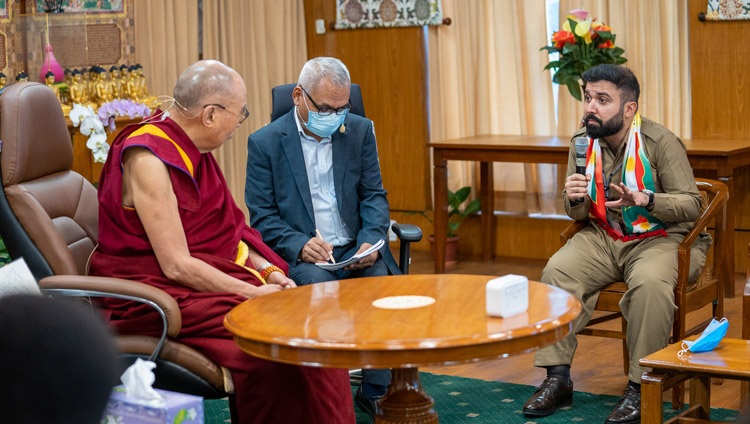
Hazar, a Kurd from Irag sharing his story on the second day of the dialogue with His Holiness the Dalai Lama and United States Insitute of Peace (USIP) youth leaders in Dharamsala, HP, India on September 23, 2022. Photo by Tenzin Choejor
Roya from Libya, is focussed on leading and supporting projects that drive peace and reconciliation, arts and cultural engagement, development, economic stability and education. She says that having realized that she had the ability to bring about change, she makes a point of encouraging others likewise to understand that each one of us can help others. We can make a difference.
Sophia from Venezuela recounted that she and her best friend ran for election as Secretary General of their school United Nations organization. The students first gave the impression that Sophia’s friend would be most suited and that she would be least suited to the role. However, everyone was taken by surprise when she was actually elected. She said she learned that if you’re going to be a leader you have to be confident.
David Yang told His Holiness that he is regarded as a leader with regard to inner peace. He asked him to describe how he felt when he had to leave Tibet.
“First of all, there was a danger to my community and to my own life,” His Holiness replied. “I escaped because the situation had become urgent. When the Chinese military officers wanted to know where the Dalai Lama was staying within the Norbulingka Palace, we didn’t know if it was so they could provide protection from bombardment, as they claimed, or so they could more readily target me. Once I’d become a refugee, I felt happier because I was free.
“In today’s circumstances, all seven billion human beings alive today want equality. As I’ve said, we are all the same. No one is better or more deserving than anyone else. The UN should not only involve political leaders but representatives of ordinary human beings. We need to look realistically at the situation we find ourselves in because we all have to live together.
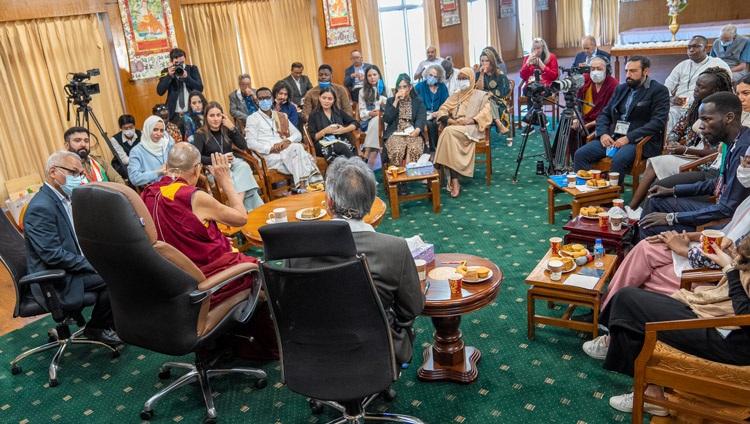
A view of the meeting room at His Holiness the Dalai Lama’s residence on the second day of the dialogue with United States Insitute of Peace (USIP) youth leaders in Dharamsala, HP, India on September 23, 2022. Photo by Tenzin Choejor
“We need to think more about what the common interest is, much like the European Union. We need a Union of Humanity.”
In answering questions put to him by the youth leaders His Holiness talked about reaching decisions. He explained that, although he has resigned from all political activity, whenever there is a decision to be made, he always consults the people involved.
His Holiness was asked whether some of his people may have wanted to fight back against the Chinese. He agreed that some did. However, he described it as an emotional response rather than the result of thinking things through in a realistic way. Thirty years ago, he said, world opinion counted for less. Today, it can make a difference. Now, he reaffirmed, is a time when problems should be resolved through dialogue.
He reiterated that it’s basic human nature to be compassionate. He said we can see this among children who don’t concern themselves with superficial differences. To discriminate between this or that race, nationality or religion is an old way of thinking.
“When we left Tibet,” His Holiness clarified, “we did think in terms of differences between Tibetans and Chinese Communists. If we had considered what we had in common as human beings and that the land belongs to humanity in general the outcome might have been different.
“I feel we shouldn’t focus too much on what is past. We have to look at things from different angles. As it’s turned out, I’ve found it helpful to have become a refugee.”
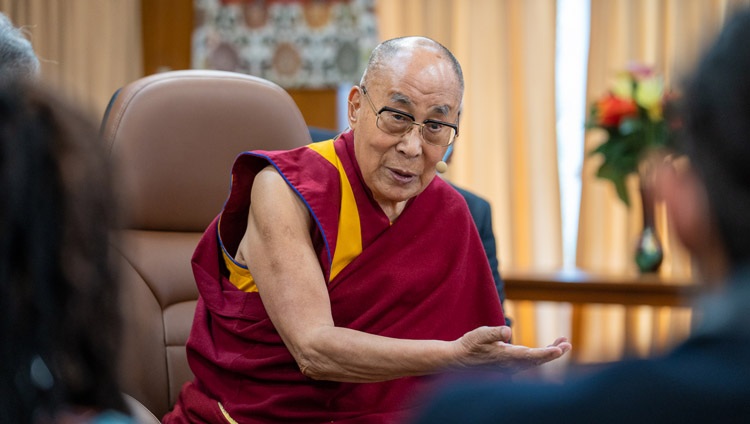
His Holiness the Dali Lama answering a question from one of the United States Insitute of Peace (USIP) youth leaders during their dialogue at his residence in Dharamsala, HP, India on September 23, 2022. Photo by Tenzin Choejor
Asked whether there will be a fifteenth Dalai Lama and if there is, where will he be born, His Holiness replied with a chuckle that that was his business.
“I’m now 87 and I think I can live for another 15 or 20 years, so whether or not there will be a fifteenth Dalai Lama is not my main concern right now. Probably I’ll be born on this planet because I have a connection to this world. The first Dalai Lama said he wanted to be born in Tibet so he could continue to serve the Tibetan people and the Buddhadharma.
“My determination is to serve sentient beings, but I’m especially familiar with this planet and its people. But where I’ll be born, I don’t know. I have a connection to the Bodhisattva Avalokiteshvara. I’m something like his representative, so it may be a matter of his wish.
“There is a famous lake in Tibet and three letters were revealed on its surface which indicated where I had been born. A for Amdo, Ka for Kumbum and Ma referring to my name Lhamo Dhondup. Employing such mysterious forces can help us see further ahead.”
David Yang introduced five more youth leaders who would talk about equality and justice.
Gloria from South Sudan is deeply concerned about human rights and civic rights issues. She pushed for tax exemptions on sanitary products to scale down gender inequality, especially in schools. She told the story of a school friend who was taken by surprise when she had her first period at school. Despite her friends’ help she felt shamed by the jeering comments of other classmates. Next day she didn’t come to school.
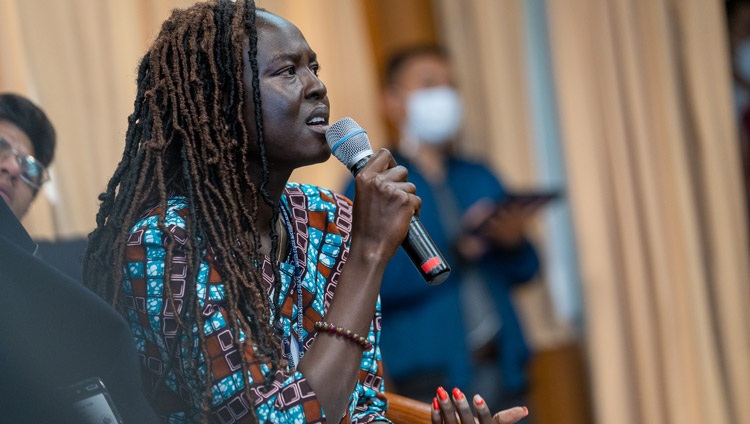
Gloria from South Sudan delivering her presentation on the second day of the dialogue with His Holiness the Dalai Lama and United States Insitute of Peace (USIP) youth leaders in Dharamsala, HP, India on September 23, 2022. Photo by Tenzin Choejor
Gloria asked herself why a natural bodily function would bring such shame. She resolved that she had to do something to help girls understand their bodies and reduce the stigma of menstruation. She was keenly aware that girls also have a right to education.
His Holiness commented that decisions should not be made under threat of force or as a result of bullying. That’s an old way of thinking. Now, we’re all equal and have a right to decide things for ourselves.
Mamdouh from Syria led two peace-building and development projects during wartime helping war casualties, people with disabilities, local communities and internal refugees. He described being frustrated trying to bring about change. He said he’s been banging on doors for ten years—sometimes they open, sometimes they don’t. We are trying, he declared, and we can all help.
Mohamed from Somalia has hands-on experience in areas of post-conflict justice, local government and peace-building. He spoke of meeting a woman whose legal case had been dragging on for years. He saw this as a case of justice delayed being justice denied. He observed that although rights are laid out in the constitution, people can’t exercise them. Many have left the country in search of other options, but he feels that if he doesn’t stay, who will stay to build a more peaceful Somalia?
His Holiness remarked that the world is becoming more democratic, so people can raise their voices and their voices can be heard.
Isabela from Colombia is moved to defend human dignity and fundamental rights. She told of her shock when her mother told her that her father had shown her how to use a gun when she was only four years old and placed a gun under her pillow by way of defence. Isabela asked herself why people should live in fear like that and decided to become a lawyer. She is concerned to protect human dignity and to see that all children have access to education.
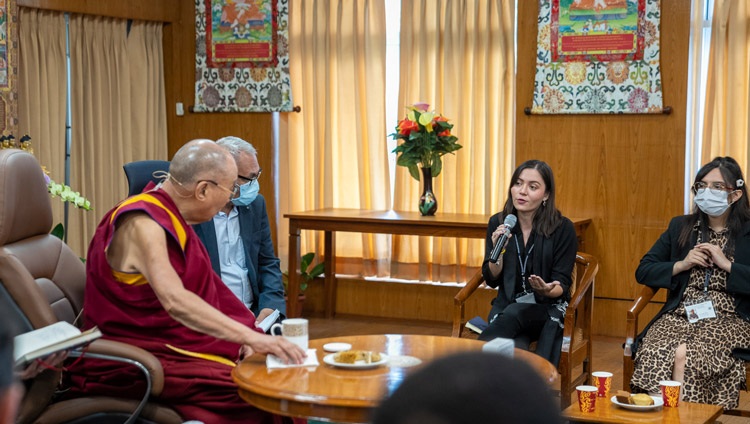
Isabela from Colombia sharing her story on the second day of the dialogue with His Holiness the Dalai Lama and United States Insitute of Peace (USIP) youth leaders in Dharamsala, HP, India on September 23, 2022. Photo by Tenzin Choejor
Nissa from Libya announced that she is a climate change activist. She described being moved by the film, An Inconvenient Truth, which woke her up to facts about pollution and climate change. She decided to teach children about these things and was baffled to find that children can readily understand what global leaders apparently cannot.
“Climate change is serious,” His Holiness agreed. “We have to take steps to green the world by planting and taking care of more trees. I was recently in Ladakh where the dry, sandy environment is changing because there are more trees. Faced with a crisis like climate change we cannot afford to fight among ourselves. We have to work together.”
Responding to questions again, His Holiness repeated that we need to look at things from a wider perspective. With regard to Tibet, he mentioned Tibetans’ deep cultural heritage, which includes a profound understanding of the workings of the mind and emotions. This culture has been kept alive. He noted wryly that very few Tibetans had become Communists, but quite a number of Chinese had become Buddhists.
His Holiness reported that professors in Chinese universities have read books published by Tibetans in exile on science and philosophy in Buddhist literature. They have acknowledged that Tibetan Buddhism has indeed preserved the Nalanda Tradition, which adopts a scientific, investigative approach.
Asked how to achieve justice without losing compassion, His Holiness observed that the important thing was to avoid doing harm. He added that helping sentient beings can be a source of great satisfaction.
“All of us,” he added, “animals as well, have basic rights that we need to protect.”
Asked to say how you make your voice heard, His Holiness replied that first you should be honest and second you should act out of compassion. That’s the right thing to do. The main thing is to forgive and practise compassion.
David Yang thanked members of His Holiness’s office, his attendants, and the audio-visual team. He thanked the 26 youth leaders who represent hope for the future. And finally, he thanked His Holiness for his inspiring contribution.
His Holiness responded, “Thank you. As part of the seven billion human beings alive today we have a responsibility to work to create a happy humanity and a peaceful world.”
He then invited the youth leaders and supporting USIP staff to join him for lunch.












